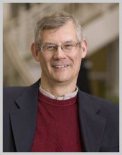Douglas Moo is Blanchard Professor of New Testament,Wheaton College, Wheaton, Illinois, USA. He is Chair of the Committee on Bible Translation charged with oversight of the NIV and TNIV Bibles.
Professor Moo’s research interest is in New Testament exegesis and theology, particularly the letters of Paul. He is currently working on a commentary on Galatians and a Pauline Theology.
Professor Moo has a particular interest in the way the created world is presented in the New Testament, with implications for current environmental issues.
Recent Publications in New Testament Studies
- The Old Testament in the Gospel Passion Narratives. Sheffield: Almond, 1983 (reprint; Eugene, Ore.: Wipf & Stock, 2008).
- "’Law,’ ‘Works of the Law’ and Legalism in Paul." Westminster Theological Journal 45 (1983): 73-100.
- "Jesus and the Authority of the Mosaic Law." Journal for the Study of the New Testament 20 (1984): 3-49.
- "The Problem of Sensus Plenior." In Hermeneutics, Authority, Canon, ed. D. A. Carson and J. D. Woodbridge. Grand Rapids: Zondervan, 1986.
- "Israel and Paul in Romans 7.7-12." New Testament Studies 32 (1986): 122-35.
- "Paul and the Law in the Last Ten Years." Scottish Journal of Theology 40 (1987): 287-307.
- A Commentary on the Epistle to the Romans. New International Commentary on the New Testament. Grand Rapids: Eerdmans, 1996.
- The Epistle of James. Pillar Commentary. Grand Rapids: Eerdmans, 2000.
- Introduction to the New Testament. Revised ed. Grand Rapids: Zondervan, 2005 (with D. A. Carson).
- "Israel and the Law in Romans 5-11: Interaction with the New Perspective." In Justification and Variegated Nomism: The Teaching of Paul, ed. D. A. Carson, Mark Seifrid, and Peter O’Brien. Grand Rapids: Eerdmans, 2004.
- "The Christology of the Early Pauline Letters." In Contours of Christology in the New Testament, ed. R. N. Longenecker, 169-92. Grand Rapds: Eerdmans, 2005.
Recent Publications in Science and Religion
- "Nature in the New Creation: New Testament Eschatology and the Environment." Journal of the Evangelical Theological Society 49 (2006): 449-88.




